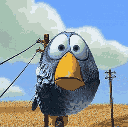SAMEDI
17 mai 2025
de 14h00 à 19h00
dans le cadre du Nouveau cycle
"Techniques fécondes, tonique faconde"
Animation : Régis MOULU
Thème : Doser l'excès, oser les clichés
Être
excessif fait du bien. Ce relâcher génère d'ailleurs
bien souvent du comique, a minima de l'expressivité, presqu'une
éloquence. Pour un écrivain, s'autoriser ce "penser
facile" qui peut être assimilé à un jugement
hâtif ou même un cliché avec toute sa part discriminante
importe. À mettre donc dans la bouche de ses personnages comme
pour mieux faire réfléchir, comme pour mieux susciter des
réactions. C'est la maîtrise de cet élément
qui a animé notre présente séance, histoire de mettre
une corde supplémentaire à son arc, une corde délicate
et peu usitée.
Remarque
: au-delà de la contrainte formelle
(thème), les sujets suivants (au choix) ont été énoncés
en début de séance :
Sujet 1. - " Je ne suis pas le monstre que vous croyez. Et vous non plus,
même si on pourrait largement croire le contraire ! "
Sujet 2. - Écrire un texte dans lequel votre personnage principal est
un expert/spécialiste/à la pointe de quelque chose, au point où il s'en
réjouit, frime, parade, bluffe et impressionne son auditoire, exagérément.
Sujet 3. - Écrire un texte où les thèmes majeurs seront " la vie, la mort,
l'amour, l'amitié " qu'il faudra aborder via des thèmes secondaires tels
que la jalousie, l'orgueil, le dépassement de soi, l'idolâtrie, l'harmonie,
le respect, la grâce, l'honneur (ou ce que vous voudrez)… .
 Pour stimuler et renforcer l'écriture et les idées
de chacun, un support comportant tous les usages des clichés dans
notre littérature a été distribué en ouverture
de session.
Pour stimuler et renforcer l'écriture et les idées
de chacun, un support comportant tous les usages des clichés dans
notre littérature a été distribué en ouverture
de session.





- " "Escragotesques" funérailles"
de Nadine CHEVALLIER
- "Je t'aime parce que tu es un chef d'oeuvre inachevé" de Régis MOULU
- "Guess who ?" de Claudine CARPENTER (texte en anglais)
" "Escargotesques" funérailles" de Nadine CHEVALLIER
Mais pourquoi tu l'as écrasé ? Maintenant, il est mort, on dirait ?
" se désolait Mimi, accroupie, les larmes aux yeux, en contemplant l'escargot
aplati sur le tapis. " Tu crois qu'on peut le soigner ? " ajouta-t-elle.
Elle essayait de rassembler les morceaux de coquilles agglutinés dans
une infâme bouillie grise. " En plus, c'était mon préféré, il s'appelait
Pedro l'escargot, il avait gagné la course avant le tien ! " Loulou,
les poings sur les hanches, se dandinait devant elle. "- Même pas vrai
! C'est pas lui Pedro. Ton Pedro, je l'ai lâché dans la poubelle hier.
Celui là, c'est un nouveau. Et on s'en fiche, des escargots, y'en a
plein le jardin. - Peut-être mais pourquoi tu l'as écrasé sur le tapis
? Maman va te gronder, ça fait tout sale. - C'est vrai que c'est dégueulasse
un escargot écrasé … - Oh ! T'as dit un gros mot ! On n'a pas le droit
… - Des gros mots, j'en connais des tas, figure toi. Maman le saura
que si tu lui dis. Tu vas lui dire ? - Ben non, t'es mon frère quand
même … enfin … je sais pas… Pourquoi tu l'as mis dans la poubelle Pedro
? - T'inquiète, je l'ai mis dans la verte, celle des légumes, il adore.
- Ah, d'accord. Mais celui là, il est vraiment mort ? - Ben oui, Nunuche,
quand on n'est plus vivant, on est mort ! - Alors, on peut l'enterrer
? - N'importe quoi, il est collé au tapis ! - Eh ben, on n'a qu'à mettre
le tapis avec … " Elle roule le tapis et suivie par son frère, l'emporte
au fond du jardin. Sous la haie, un espace découvert expose un cimetière
de petites tombes cerclées de cailloux blancs, surmontées de branchettes
liées en forme de croix. "- Il y en a beaucoup maintenant, remarque
Mimi. - Pas autant que de morts à la guerre de 14, s'écrie Loulou. -
Y'en avait combien à la guerre de 14? - Des milliards ! - C'est beaucoup,
nous on aura pas assez de place. Ils sont où les milliards ? - Oh, partout,
y'en a dans les catacombes aussi. - C'est quoi les catacombes, on peut
y aller ? - C'est à Paris, c'est trop loin. - Moi quand je serai grande,
j'irai à Paris. Tu viendras avec moi ? - Non, moi, je serai soldat,
je serai peut-être déjà mort à la guerre. - Non, je veux pas que tu
meures ! T'es pas drôle... " Les enfants avaient étalé le tapis et tentaient
de le recouvrir de terre. " - Il prend beaucoup de place ce tapis, on
n'en aura plus pour les autres morts, s'inquiète soudain Mimi. - T'as
raison pour une fois … On va juste découper le bout où il y a le cadavre,
ça sera moins grand, d'accord ? - Bonne idée " Loulou tente de découper
le tapis avec de grand ciseaux trouvés à la maison, mais ne réussit
qu'à gratter quelques fibres. " - C'est pas une bonne idée, finalement,
décide-t-il, On va plutôt le cinérer. - C'est quoi cinérer ? - Ben,
c'est comme l'oncle Martial, lui quand il est mort, on l'a cinéré, ça
veut dire brûler dans un four, ça fait cinérer. Comme ça , ça prend
moins de place. - Ah, bonne idée, comment on fait ? - On va le mettre
sur la plaque dans le four avec le bouton comme Maman fait pour le nettoyage,
ça chauffe à fond. Et on récupérera les cendres. " Ainsi fut fait. Une
atroce odeur de caoutchouc brûlé envahit la maison. Maman arriva à temps
pour débrancher le four, ouvrir en grand toutes les fenêtres. Avec sidération,
elle interrompit l'incinération.
"Je t'aime parce que tu es un chef d'œuvre inachevé" de Régis MOULU, animateur de l'atelier
L'homme se mit devant le mannequin nu du magasin de vêtements, lâcha
ce nuage de mots assemblés en phrases : je t'aime parce que tu es un
Picasso. Je t'aime parce que tu es un Manet. Je t'aime parce que tu
es un Klee. Je t'aime parce que tu es un Modigliani. Je t'aime aussi
parce que tu es un peu Turner. Je t'aime sous réserve parce que tu es
un Bacon. Je t'aime parce que tu n'es pas un Rubens. Je te regarde avec
des " yeux de précipice " parce que tu es dans les vapeurs d'un Cézanne.
Tu n'as rien d'un Fernand Léger. Je t'aime parce que tu as failli être
un Dali. Je t'aime plus que tout quand tu me fais croire que tu es un
Klimt. Respect. Confusion. Admiration. Je cabriole un peu trop dans
ma tête. J'espère retomber un jour sur mes pattes. Ce n'est pas si facile,
rien n'est moins sûr… Là, mon émotion s'est habillée en moi, me régit,
a pris ma place, m'a exilé. Malgré cela, je continuerai à te faire mon
aubade, avec des mots et des idées venus tout droit de mon squelette.
Car le désir, c'est de la moelle rechapée en intentions, voilà les miennes,
c'est reparti ! Je t'aime parce que tu es profondément un El Greco,
je voulais que tu le saches. Mais je t'aime plus que tout pour ton esprit
Caravage, je l'avoue sincèrement. Veux-tu être enfin mon Renoir qui
me cacherait son Schiele, allez prends-toi maintenant pour un Van Gogh
afin que je profite à fond de ton Botticelli, espèce de " Léonard de
Vinci grande période " ! Bref, ce que j'aime en toi, c'est que tu deviens
toutes les œuvres d'art à la fois. Et ce qui me plaît, c'est ton aspect
" chef d'œuvre inachevé " ! Tu es ce que je rêve. Ton corps blanc m'offre
sa toile de cinéma, mes yeux redeviennent vidéoprojecteurs, tu es mon
paysage mental qui défile, tu ressembles à la route que je vais prendre,
tu contiens le monde, tu en es sa porte, ta main sa clenche dont je
me saisis. Ah, s'il n'y avait pas de vitre à cette boutique, je te dévaliserais,
membre par membre, tu es ma journée qui commence, tu es ma penderie
que je n'ouvrirai pas afin qu'on reste dans la sauvagerie de notre vérité.
Tu es ce goût de vacances qui me revient, ce bout de langue en moi qui
t'est consacré, cette présence que je chéris, ce souvenir palpable,
car je n'ai plus peur que tu m'incarnes, vas-y fonce en moi. Tu ressemble
à un " derrière de dune ", tu es ce chemin que je prends, tu es aussi
le vent qui m'y transportera, tu es le " désir qui vaut motricité ",
cette téléportation incluse, cette annulation de toute distance sans
doute parce qu'en toi il y a un peu d'éternité, quand je réfléchis bien,
tu es tous les plats que je mange et je ne les détaillerai pas, mon
avenir et son carburant, ma vision qui se précise et ma vue qui se dégage,
tu es cette corneille qui passe dans le ciel tel un pinceau qui repeint
l'azur, tu es cette ouverture, cette entrée dans les viscères de l'espoir,
ce cœur, réserve à foudre pour mes désirs, cette boîte à idées sans
aucun papier, ce lieu où je me recrée en t'inventant, cette plage de
possibilités où le soleil de ma déraison vient s'abandonner, tu es une
luminosité, une teinte, une couleur par encore répertoriée, ce renflement
supplémentaire, cet ourlet qui double le ciel, un rabe de vision qui
m'est offert, tu es déjà là avec ton fantôme, j'aime cette rémanence
que tu te trimballes constamment, quand je ferme les yeux, tu es encore
là, quand je les rouvre, je te découvre encore plus grande. Tu es le
temps qui explose. Météorite après laquelle je cours. Et voilà que je
me rends compte que vous êtes plusieurs en vitrine. Est-ce normal de
redire la même chose au mannequin d'à-côté ?
"Guess who ?" de Claudine CARPENTER, texte écrit en anglais et lu-traduit à l'oral en français lors de la séance
Guess who I am if you dare. I am famous, famous for how efficiently
I managed to bar the entrance to a coveted historical place. I am, in
other words, The Bouncer of Greek mythology. No, I am not Cerberus…
Cerberus, bless his brawny shoulders, wasn't really a bouncer… Cerberus
stood by Hades' side, he growled and looked scary, and helped his master
herd unruly souls into hell. Cerberus was a glorified sheep dog who
unlike me never had any brains… just muscle. He obeyed orders efficiently
and swiftly but he never thought any strategy through. He never needed
to. I wish I could tell you more about Cerberus, I know how popular
he is in books and films nowadays, but I can't… His three heads contained
a total of nine brain cells maximum, so any conversation I ever had
with him was extremely limited. He never had much to say for himself
poor thing. I have a voice. Listening to it may cause you to die an
untimely death. No silly, I am not a siren… Sirens did act as guardians,
for rivers and straights, you are quite right. Sirens were ruthless
killers, right again, the tale of how they lured countless men to their
death was immortalised by Homer. However, unlike mine, their modus operandi
was rather basic… flirt with the guys until they take their eyes off
course and crash their ship into rocks. It was efficient, I'll give
you that. Few ships managed to sail through the strait they guarded
in Massa Lubrense but it wasn't very interesting as far as strategy
goes. (Dear reader, please forgive me, this sour grapes. You see, I
would have loved to be a Siren myself when I was young but I just didn't
have the looks. I am not a team player anyway, so it probably was a
blessing in disguise.) I am a woman though so you are getting warmer.
I am a woman and I am a dangerous. Don't look me in the eye or have
a conversation with me, it could be fatal. Medusa? No, no… I am not
Medusa, of course not. I rather liked Medusa actually… she was fun and
fierce and she was ruthless and, just like me, she was a lone wolf.
We'd meet up occasionally to go out for a few pints of ambrosia and
we'd have a whale of a time. We'd stay out until the early hours of
the morning and she'd finish the night in my bed because she'd missed
the last ferry home. I really enjoyed that, because despite all the
nasty stuff they say, Medusa was hot… big time. She had this steaming
body and (as you all know) killer eyes. Her hair was a mess, I'll give
you that, she was a little scruffy sometimes but she (as you all know)
never liked mirrors. I liked her hyperactivity, her quick mind, her
rage… She was in a different class from those bimbos from Capri (whoops,
there I am bitching about them again). What Perseus did to her was quite
horrible. I still get upset when I think of it, even nowadays. Have
you guessed yet? Even if it is just through a process of elimination?
You ought to. Come on! Make an effort! A bouncer, a woman, who's not
beautiful but smart… A woman who it can be dangerous to talk to. Ok…
most of you have got it, I think. Those of you who know, will understand
how fitting it was for me to start my story with a riddle. I love riddles,
and it is actually my ability to present impossible, unsolvable problems
to others that got me a place in his-tory or rather my-thology. Those
of you who don't get it…If we were having conversation in person, I
would already have pounced on you with my lioness haunches, or swooped
down onto you with my bird wings and eviscerated you with my beak or
fangs or whatever they have decided I have instead of teeth and gobbled
you up. Because I never did suffer fools gladly... That is where the
second part of my legend comes from. I wasn't born a monster. I was
a perfectly normal baby and little girl. My hips were rather wide and
my nose was a little large and pointed, that much is true… But, honestly,
Sophocles' turning me into a lion-haunched and bird-winged animal human
hybrid… well that was just petty and nasty. My issue, like Medusa (and
unlike the blondies), was that I had brains. This was at a time when
women weren't allowed to have any. In ancient Greece, women weren't
educated, they weren't meant to read books or to know things. They were
meant to be pretty and graceful and modest and docile and good at dancing
in order to find a husband and once they had a husband, they were meant
to have as many kids as possible and to run their homes efficiently.
Sois belle et fais des gosses. Just a quick note in passing: I ought
to be nicer about the Sirens, they were after all just girls who were
upset about their lot, rightly so, and in order to rebel against it,
they used the very weapons the patriarchy had bestowed them: their looks
and their singing and dancing talents. Thinking it through, I see how
terribly clever this is. Moreover, there is safety in numbers… Of course…
now it seems even smarter... But I digress… I became a monster because
I learned to read at age six. I would steal my elder brother's parchments
from school and I used them to piece together the written language.
Then, I started to read in secret. Even at a very young age, I knew
that what I was doing was forbidden , especially for a woman of my social
class. Life is so unfair. If I had been a boy, I would have been allowed
to go to school, to listen to the greatest teachers of the time, to
take notes on a wax tablet, to discuss and debate the finer points in
philosophy or science or literature and poetry. Instead, I had hide
in order to read my brother's books and peruse his notes that were full
of spelling mistakes because I knew that what I was doing wasn't allowed.
But I was found out…but it is only because of my big mouth, not because
anyone caught me red handed. Reading, when you do it properly, expands
your brain and widens your imagination. It makes you wonder, it makes
you ask questions and when you have questions, you want to find the
answers. I couldn't find the answers to all my questions in the few
books my brother brought back from school (he wasn't the kind of student
that took extra reading home, quite the opposite actually), so I started
asking questions to others: my mother, the maids (they didn't know),
my faither, guests to the house... I got the answers to some questions
but the answers led to more questions, which I would ask as well. And
so on, and so forth. The desire for knowledge is an addiction, a virtuously
vicious circle. And it is dangerous. One day, I asked too many questions,
questions that were too complicated. And I was found out. And I was
shunned. And I was thrown out on to the street as the unnatural being
I was. And so I became a monster. I became a terrifying chimera, a monster
with the body of a woman and the brains of a man. I would walk up to
men on the street, ask questions, present them with conundrums, make
them think and wrack their brains and tease them when they were unable
to find the answer to questions that seemed so basic to me. I did quiz
them and question them and tire them out intellectually and I suppose
I ruffled their pride but I never killed or devoured a single one of
them. I did however emasculate them a little, which is, as we all know
a fate worse than death. However let this be said clearly: it is my
hunger for knowledge that made me monstruous, not my hunger for human
flesh. Anyway, that is why I was later thrown off the streets of Thebes
and had to guard its entrance. Or rather, I wasn't really in charge
of guarding the entrance to the city but I would stand at the road leading
to the city and ask passing travellers to answer my questions. They
were questions, not riddles and most definitely not that stupid four,
two and three legged riddle. At that point, due to my exile, I had no
access to books and I still had so many questions! Some of these travellers
were put off by me and decided to turn back because if all the women
from Thebes were like that… well the city would be no fun. My terrible
revenge on my hometown was to prevent wealthy merchants from doing business
and spending their money there. Wow. How scary… Hell hath no fury and
so forth. Then came Oedipus. I knew what was going to happen with Oedipus
from the very start. He had the same arrogance as his father the King
and the same bovinely stupid gaze as his mother, the Queen. He was the
same build as his father and I remembered seeing the pendant he was
wearing hanging around Jocaste's neck. His swollen deformed feet served
as a reminder of what his parents had done to him when he was born and
also gave his true identity away. I knew who he was… Anyone would have
known. My dear friend Cassandra would be able to tell you that soothsaying
is only a matter of carefully looking at the clues you have at hand
and using them and some basic probability calculations to work out what
will happen. But clever, perceptive women are rarely listened to, and
Cassandra's tears were tears of frustration at not being listened to,
not because she was sad. Do you know what question I asked him? Of course
it wasn't the one about man's three ages. Any six year old can solve
that one. I asked him what happened when a man met his father and killed
him. I asked him what would happen if this man married his mother. I
asked him about the monstruous children she would bear this hypothetical
man. He didn't answer. He knew what I was getting at. The oracle in
Delphe had already told him what was going to happen. He didn't want
to stop and think of the consequences of his actions. So he didn't answer.
He killed me instead. He raped me first of course. I had asked for it,
after all. So I am dead. The Sphinx, the terror of travellers in Ancient
Greece was killed by Oedipus's rightful masculine wrath. But this isn't
the end… I live on. I live on in every girl who would rather go to the
library than play with dolls. I live on in every girl who wants to build
bridges instead of making cupcakes. I live on in every daughter who
exhausts her father with her endless questions. Medusa… Medusa lives
on in every angry woman venting her frustration on a punching bag or
in a kickboxing class, in every woman marching for women's rights, in
every nasty woman standing in an agora and facing up to the patriarchy
with her words and anger. Here she is, standing by my side, smiling,
tall, strong, face bare and hair uncombed, she wearing army fatigues
and combat boots… The knife she has in her hand has dribbled a little
blood over my copy of Oedipus Rex, I think this is quite apt so I won't
clean it off Armies of sirens are leaving beauticians, flipping their
shiny hair away from their beautiful faces with red-taloned hands. With
their high heels and sexy clothes, they aren't aiming for mens' jugular
any more, no they are aiming lower, no… not their hearts… it's the wallet
they are going for silly! Cassandra isn't crying anymore. She is watching
us, assessing, calculating. She has a pretty clear idea of what is going
to happen. And it makes her smile. And very soon… You'll see it too.